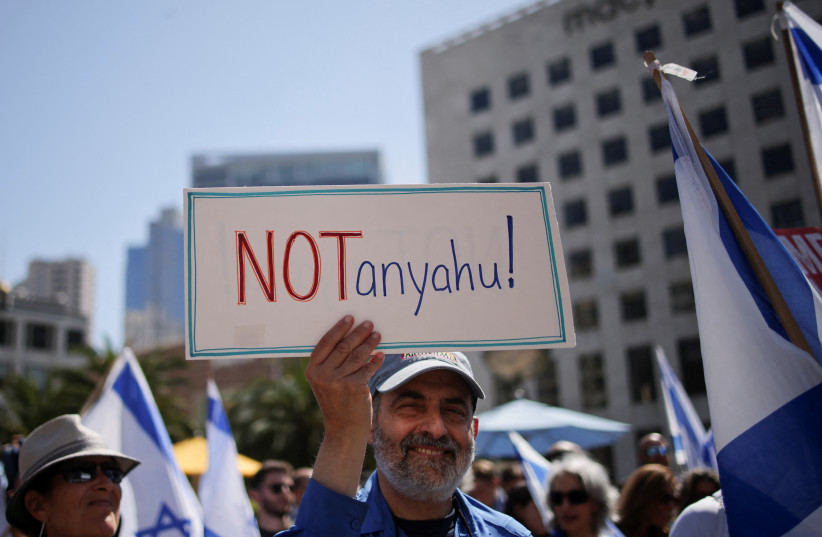What happened this week on the streets of New York and on the side of Alcatraz Prison is unprecedented in Israeli history. For years, the ethos was simple – when a prime minister, even one you disagree with is overseas, you do not attack him. That stays inside Israel.
It was a culture that Menachem Begin instilled in Israeli politics back in the 1950s and 60s when he would brutally attack the government in the Knesset and at political rallies on the streets but never when he was overseas. Then, he did not say a word.
That is definitely not the case anymore in Israel. Take former prime minister Ehud Barak as an example. He told CBS this week that Netanyahu is isolated, desperate, and wants to destroy Israel’s democracy. Saying that in Hebrew is one thing. Flying to the US and sitting in the CBS studio is another.Top ArticlesRead More
Yom Kippur War: Was it Israel’s spectacular victory or crushing defeat?
It is also what the protesters against the judicial reform showed on Monday when they projected the words “Welcome to Alcatraz Bibi” on the infamous prison next to a picture of the prime minister in an orange jumpsuit.
If Begin refused to air dirty laundry overseas, nowadays Israelis seem to prefer to flaunt it.

Contrary to claims by the Likud, it wasn’t these protesters who broke Menachem Begin’s old rule. Netanyahu, last year, put out a video as opposition leader – in English – calling on people around the world to speak out against legislation that the previous government was considering that would have limited his ability to run again for prime minister.
Why did Netanyahu put out the video in English if not to try and delegitimize the Bennett-Lapid government on the global stage? It is true that the protesters in New York and California took this to a new level but they just upgraded a social shift that had already begun.
While some might watch the protests at Times Square or outside US President Joe Biden’s hotel and celebrate democracy, there is another aspect to think about – Israel’s security.
Opportunistic attacks crossing boundaries in Israeli politics
It is a simple question – when is the best time to try and attack your enemy? Do you do it when your adversary is united, socially cohesive, and strong, or do you prefer to wait for a moment when your adversary is divided, weak, and vulnerable? The answer is obvious. Any rival would look for the opportunity that gives it an advantage over the other side and that is exactly what is happening now.
The escalation along the Gaza border, in the West Bank as well as the uptick in terrorist attacks in Israel and the tension with Hezbollah are all more severe today because of the situation within Israel. These enemies are familiar with Israel’s advanced weapons and superior technology, but they would be wrong not to consider that there is a unique opportunity right now to wreak some havoc in Israel and that they should utilize it to their advantage.
The problem is that this is the message we, on our own, are sending right now to the world. Do the protesters have the right to fight against judicial reform? Of course, they do and they should use it, but that does not mean that we should ignore the price that the country might end up paying.
This is not to say that the protesters will be responsible for a war if one breaks out soon. That responsibility lies in the lap of the government which should have stopped this madness months ago immediately after Justice Minister Yariv Levinunveiled his radical plan, shocking the nation and even Netanyahu.
But we cannot ignore the way Israel is perceived today. While it was nice to see Netanyahu finally meet Biden after nine months in office, this is not the way the prime minister is usually greeted by a sitting president. Until now, the prime minister would have flown to Washington, stayed at the Blair House on Pennsylvania Avenue, driven across the street in a convoy, and then escorted to the Oval Office for the official meeting and opening statements.
This time, Netanyahu went to the Intercontinental Hotel. There was no Oval Office, no Marine salute, and no lunch in the Roosevelt Room. It was a meeting on the sidelines of the United Nations GA, and like meetings on the sidelines, it was not only Netanyahu who met with Biden on Wednesday. As he left the hotel, Brazilian President Luiz Inácio Lula da Silva made his way to the hotel for a meeting with Biden.
This does not go unnoticed. It might not be the daylight that President Barack Obama intentionally sought to create with Israel so he could futilely attempt a so-called reconciliation with the Muslim world, but it is close. If in the past, the world understood that the path to the US ran through Jerusalem, today that is far from being the case. Countries see the cold shoulder Israel receives in the US and interpret it as another sign of the falling Israeli scepter. Plainly put, this does not bolster Israeli power and deterrence.
Can this be fixed? The first step, which is the easiest, is putting a stop to the judicial reform. The way that Religious Zionist MK Simcha Rothman spoke to a civil servant who appeared before the Law Committee that he chairs this week was an example of how far the madness has spread. The situation cannot improve until Netanyahu retakes the reins and puts people like Rothman back in their place.
Israel’s prime minister heard from Biden how much the US wants to advance Israeli-Saudi normalization but also how Jerusalem will need to do its part. That does not refer just to the concessions that might be required to the Palestinians but also to the order that needs to be restored at home and ending the judicial battle that is ripping the country apart and weakening it on the world stage.
And considering how Monday will mark the 50th anniversary of the Yom Kippur War, the country’s bloodiest debacle, it is hard to understand how our political leaders still don’t get it. In 1973, we were surprised by our enemies due to hubris, and as a result, we paid an unimaginable price.
How can a country knowingly march in this direction once again?
The writer is the immediate past editor-in-chief of The Jerusalem Post.




